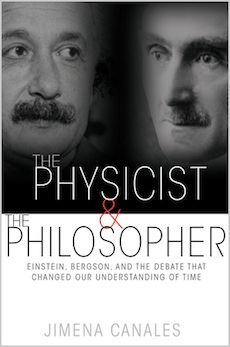By Benjamin Franklin Martin
An important element of the intellectual history in the twentieth century began with a single confrontation: 6 April 1922, before the Société française de philosophie in Paris, between Albert Einstein and Henri Bergson over the question of time. In his “Theory of Special Relativity” (1905) and “Theory of General Relativity” (1915), Einstein argued that by adopting the speed of light as a constant, the properties of time could be measured absolutely and explained even when these measurements defied Newtonian physics and Euclidean geometry. In his Durée et Simultanéité (1922), Bergson argued that time was linked to human consciousness and that its duration swept immeasurably through past, present, and future, interweaving memories, events, and premonitions.
At Paris, and afterward for the rest of their lives, Einstein insisted on the “time of the physicists,” while Bergson insisted on the “time of the philosophers.” Neither truly understood the other. Einstein claimed that Bergson simply did not grasp the physics of relativity and was proposing an unquantifiable “metaphysics.” Bergson claimed that Einstein’s equations measured only a single, and hardly the most important, aspect of time and thus revealed the poverty of “science” in banishing intuition.
Personal differences sharpened the antagonism between them. Bergson was considered the greatest philosopher of the day, was proudly French, and was a thoroughly assimilated Jew who considered conversion to Catholicism. He won the 1927 Nobel Prize for Literature. Einstein was seeking to become the greatest physicist of the day, was proudly internationalist, and was defiantly a Zionist Jew. He won the 1921 Nobel Prize for Physics. They both served, with Bergson as chair, on the League of Nation’s International Commission for Intellectual Cooperation, but agreed on little and Einstein soon resigned.
Intellectuals of all disciplines and their movements divided bitterly and not always as expected: Gaston Bachelard, Jean Becquerel, Ernst Cassirer, Bertrand Russell, and logical positivism for Einstein, Jacques Maritain, Maurice Merleau-Ponty, Martin Heidegger, and phenomenology for Bergson. When various scientific experiments confirmed predictions based on Relativity Theory, Einstein appeared to have won the contest. Yet when physicists divided over the contradictions between Relativity and Quantum Mechanics, Bergson’s ideas found new relevance as a precursor to Werner Heisenberg’s uncertainty principle.
Jimena Canales has explored these recondite ideas and disputes in a book remarkable both for its profound research and for its elegance in presentation. Intellectual history should always be so accessible.
Benjamin Franklin Martin (ΦΒΚ, Davidson College, 1969) is the Price Professor of History at Louisiana State University and a resident member of the Beta of Louisiana Chapter of Phi Beta Kappa.




